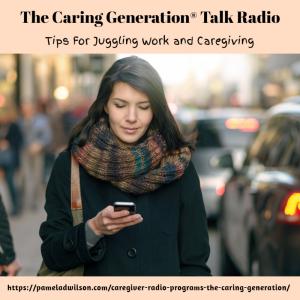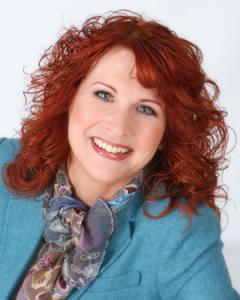The Caring Generation® Radio Show: Family Caregiver Support Programs
Practical Tips and Support Programs for Family Caregivers and Corporations by Caregiving Expert, Pamela D. Wilson
GOLDEN, CO, USA, January 13, 2020 /EINPresswire.com/ -- Caregiving expert Pamela D. Wilson hosts The Caring Generation radio program for caregivers and aging adults Wednesday, January 13, 2020, live on the Bold Brave Media Global Network and TuneIn radio. The program airs live at 9 p.m. EST. The Caring Generation® aired initially from 2009 to 2011 on 630 KHOW-AM in Denver, Colorado.
Family caregivers provide the bulk of support for elderly parents, spouses, and other family members. The majority of caregivers juggle work and caregiving while being married, raising children, and pursuing education. Caregivers are vulnerable to the effects of caregiving that include stress, emotional, and physical illness.
On The Caring Generation® radio program for caregivers and aging adults on January 13th, caregiving expert, Pamela D. Wilson shares practical tips for caregivers concerned with managing family relationships, isolation, and unexpected situations. Her expertise results from more than 20 years of managing 1:1 care for clients in a variety of healthcare and home settings as a professional fiduciary and care manager.
Special guest Rita Choula, Director of Caregiving for the AARP Public Policy Institute, shares research from the series Valuing the Invaluable: 2019 update. Rita shares the economic value of family caregivers, $470 billion in 2017. The growing emotional, time, workplace, and financial demands on working family caregivers will be discussed.
The Family Home is the New Hospital
Elderly adults want to stay in their homes as long a possible. This desire of elderly parents places a significant burden on family caregivers to take on tasks previously provided by trained healthcare professionals. The idea that the home is the new hospital will continue to gain publicity as caregivers take on more and more medical type tasks.
According to Wilson - “As a professional fiduciary and a care manager, I supervised and completed medical care and related tasks for my clients that included emptying catheter bags, changing ostomy bags, providing nutrition by feeding tubes, managing incontinence, and special diets that family caregivers never imagined they would have to perform. In addition to these tasks, the use of medical equipment like blood pressure machines, blood sugar monitors, INR monitoring, lifts, hospital beds, and other tasks will be the responsibility of family caregivers.”
Add to this the family's responsibility to advocate with healthcare providers, attend medical appointments, show up at hospital emergency rooms, contact insurance companies and discuss care needs with physicians. It is easy to see how the landscape of family caregiving is expanding in scope and responsibility. It’s no wonder family caregivers fear making mistakes and are intimidated about providing advanced care viewed as medical care.
Caregiving Remains a Family Issue
The changing family landscape will also affect future caregiving needs. More and more elderly adults are likely to be single, never married, widowed, childless, or divorced.
Elder orphans face the additional pressures of determining who will care for them. Blended and mixed families add complications of cultural differences and family beliefs. The reality is that not all families get along and not all adult children make competent caregivers.
Society has traditionally placed the burden of caregiving on families. This burden is affecting working adult children who are caregivers at a younger age. Millennials represent 25% of the more than 41 million family caregivers in the United States.
A John Hancock Study called the Caring Company confirms that about one-third of working caregivers leave the workforce to care for an elderly family member or a spouse. The stress of caregiving responsibilities is encroaching into the workplace. Corporations unaware of or unwilling to provide support for working caregivers may lose valuable employees. This support includes education to prepare working caregivers for what can happen, how to manage care for elderly parents, and how to plan for their care in later years.
Caregivers who work and juggle caregiving feel isolated, hopeless, and alone as they shoulder the responsibility to navigate a care system that is not always supportive. Workplace stresses and concerns about caregiver discrimination or losing a job because of caregiving responsibilities are a reality.
The details of advocating and managing care for elderly parents or a spouse can feel like a full-time job for working or retired caregivers. Until one is a caregiver, it is impossible to imagine the day to day responsibilities and the struggles that comprise caring for an elderly parent.
Caregivers seeking online caregiver support programs benefit from Pamela’s 20 years of caring for clients on a 1:1 basis because of the breadth of issues that arise when caring for elderly parents. Each setting – home, care community, medical providers, nursing homes, and hospitals – comes with unexpected complexities and issues.
While caregivers accept the responsibility of caring for elderly parents, spouses, and loved ones, many are unprepared for the level of resistance and lack of empathy that occurs within the care system. The healthcare system, rushed to provide care, does not routinely acknowledge family caregivers in the roles of power of attorney or guardian. This lack of acknowledgment presents additional complications and work for family caregivers in these roles.
Managing in-home caregivers can be a full-time task as the result of the shortage of qualified candidates and companies lacking time for training and oversight. While in-home caregivers can provide relief for family caregivers, in-home caregivers may represent a burden for the caregiver to manage and train.
Admittedly, there are no easy answers for family caregivers. Learning to complete medical tasks for elderly parents, to advocate for care, and to coordinate care with the healthcare and care systems can be a full-time job. Precisely the reason that caregiver support programs are vital to preserving the health and well-being of family caregivers.
Make plans to join Pamela D. Wilson, caregiving expert and the host of The Caring Generation® radio at 6 p.m. Pacific, 7 p.m. Mountain, 8 p.m. Central, and 9 p.m. Eastern every Wednesday night Replays of the weekly programs are available in podcast format with transcripts on Pamela’s website and all major podcast sites. More information is available on Pamela’s website.
Pamela D. Wilson
Pamela D. Wilson, Inc.
+ +1 303-810-1816
email us here
Visit us on social media:
Facebook
Twitter
LinkedIn
What to Do When it Takes More Than Love to Be a Caregiver
Legal Disclaimer:
EIN Presswire provides this news content "as is" without warranty of any kind. We do not accept any responsibility or liability for the accuracy, content, images, videos, licenses, completeness, legality, or reliability of the information contained in this article. If you have any complaints or copyright issues related to this article, kindly contact the author above.



